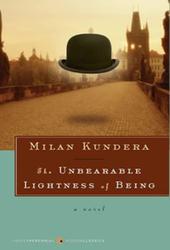 Milan Kundera, "a Communist Party outcast who became a global literary star with mordant, sexually charged novels that captured the suffocating absurdity of life in the workers' paradise of his native Czechoslovakia," died July 11 at age 94, the New York Times reported. Kundera's "run of popular books began with The Joke, which was published to acclaim in 1967, around the time of the Prague Spring, then banned with a vengeance after Soviet-led troops crushed that experiment in 'Socialism with a human face' a few months later." His most enduringly popular novel, The Unbearable Lightness of Being (1984), was an instant success, reprinted over the years in at least two dozen languages. It was also adapted into a 1988 film starring Daniel Day Lewis.
Milan Kundera, "a Communist Party outcast who became a global literary star with mordant, sexually charged novels that captured the suffocating absurdity of life in the workers' paradise of his native Czechoslovakia," died July 11 at age 94, the New York Times reported. Kundera's "run of popular books began with The Joke, which was published to acclaim in 1967, around the time of the Prague Spring, then banned with a vengeance after Soviet-led troops crushed that experiment in 'Socialism with a human face' a few months later." His most enduringly popular novel, The Unbearable Lightness of Being (1984), was an instant success, reprinted over the years in at least two dozen languages. It was also adapted into a 1988 film starring Daniel Day Lewis.
The Times noted that Kundera "could be especially pitiless in his use of female characters; so much so that the British feminist Joan Smith, in her 1989 book Misogynies, observed that 'hostility is the common factor in all Kundera's writing about women.' Other critics reckoned that exposing men's horrible behavior was at least part of his intent. Still, even the stronger women in Kundera's books tended to be objectified, and the less fortunate were sometimes victimized in disturbing detail."
Kundera's fear that Czech culture could be erased by Stalinism was at the heart of The Book of Laughter and Forgetting, which became available in English in 1979. He "had a deep affinity for Central European thinkers and artists--Nietzsche, Kafka, the Viennese novelists Robert Musil and Hermann Broch, the Czech composer Jaroslav Janacek. Like Broch, he said, he strove to discover 'that which the novel alone can discover, including what he called 'the truth of uncertainty,' " the Times wrote.
After playwright Vaclav Havel helped lead the successful Velvet Revolution in 1989, and then served as president, first of Czechoslovakia and then of the Czech Republic, Kundera's books became legal in his homeland for the first time in 20 years, but "many Czechs saw him as someone who had abandoned his compatriots and taken the easy way out," the Times noted, adding that there was scant demand for them or sympathy for him there. By one estimate only 10,000 copies of The Unbearable Lightness of Being were sold.
When Communism ended in 1989, Kundera had been living in France for 14 years with his wife, Vera Hrabankova, first as a university teacher in Rennes and then in Paris. Czechoslovakia revoked his citizenship in 1979, and he became a French citizen two years later.
The last book he wrote in Czech before switching to French was Immortality (1990). His next works were Slowness (1995), Identity (1998), and Ignorance (2000). Kundera was often nominated, but never selected, for the Nobel Prize in Literature. He completed his final novel, The Festival of Insignificance, in 2015, when he was in his mid-80s and living in Paris. In the book, he wrote: "We've known for a long time that it was no longer possible to overturn this world, nor reshape it, nor head off its dangerous headlong rush. There's been only one possible resistance: to not take it seriously."

